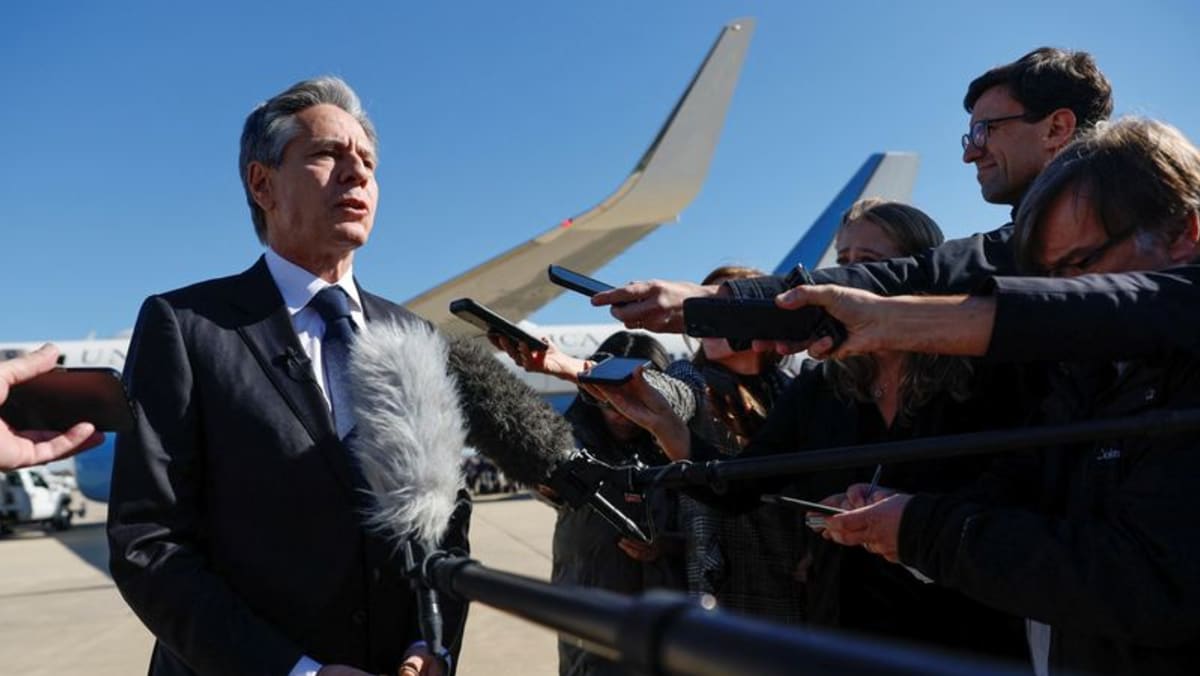As top United States diplomat Antony Blinken visits Israel on Friday (Nov 3), he would be looking to prevent the crisis from escalating in the Middle East, in part by containing Israel’s military actions, experts told CNA.
Despite having voted against a United Nations (UN) resolution calling for a humanitarian truce in Gaza, the US can still impact developments as it holds sway over Israel, having proven its support.
“I do think he will succeed at least somewhat, because the US has shown themselves to be a key ally and reliable ally of Israel and that gives him credibility, which translates into leverage,” Ms Laura Blumenfeld, senior fellow at the Philip Merrill Center for Strategic Studies at Johns Hopkins School for Advanced International Studies, told CNA’s Asia First on Friday.
“I think it’s been a crash test on the credibility of the US and I think they’ve earned their place at the table with the Israelis to demand more of them.”
On his second Middle East trip in less than a month, US Secretary of State Blinken would be aiming to contain the response of Israel, which has been striking targets in the Gaza Strip in an attempt to eradicate Hamas since the Oct 7 attacks on its soil.
Mr Blinken said discussions will focus on the future of Gaza when and if the Palestinian militants of Hamas are defeated, getting more humanitarian aid into Gaza, and finding ways to prevent the conflict from spreading.
The US has been a strong supporter of Israel, but international backlash on the way Israel has been conducting itself in Gaza has galvanised public opinion, forcing the Biden administration to respond to the pressures, said Professor Shahram Akbarzadeh, research professor in Middle East and Central Asian politics at Deakin University.
However, he told CNA938 that it would be a difficult balancing act for the US, given that it had opposed the UN resolution to protect civilians and uphold legal and humanitarian obligations in the Gaza Strip.
Prof Akbarzadeh said that top of Mr Blinken’s mind would be concern that “the American image is severely tarnished because of its support for Israeli actions”.
“I think the United States would be very keen to try and repair and show the Arab world that it is hearing Arab concerns (and) that it does try to address Arab concerns. But I think that’s a bit of a tall order given how things have evolved,” he said.
However, Ms Blumenfeld noted that one source of optimism is that the United Arab Emirates (UAE), which is part of the Abraham Accords, has not broken ties with Israel amid the conflict.
The Abraham Accords are a series of agreements signed in 2020 to normalise relations between Israel and several Arab states.
He said that while Israel has committed itself to the eradication of Hamas, it is not a realistic objective.
“Even if Hamas as the fighting force is eradicated, the end result of all this bombardment and the casualty toll (and) the death that was inflicted on the Palestinian population, is surely going to lead to another group that is just as antagonistic and just as committed to the destruction of Israel as Hamas is,” said Prof Akbarzadeh.
Ms Blumenfeld noted that the Israelis “have been very careful about who they say will run Gaza afterward”.
The Palestinian Authority or any other Palestinian group would be careful about associating with Israel, as it would immediately delegitimise them, she noted.
“I think they are hoping for some kind of international (solution), perhaps with the cooperation of the broader Arab states in the Arab region. But they are not going to say anything now about Palestinian rule, because they will be seen as puppets of the Israeli military,” said Ms Blumenfeld.
In terms of accountability, some Israelis feel that their political leaders let them down after failing to protect them from the attacks, while the Hamas group may not survive politically on the Palestinians’ end, said Ms Blumenfeld.
But ultimately, it is the victims who bear the biggest losses, she added.
“As far as justice (goes), that’s the tragic point about all of this, right? There is really no justice ultimately for the victims,” she said.


